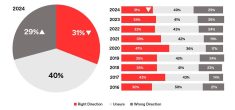“Some fluctuations are normal (but) these wild swings are unacceptable.”
– NIKOLAUS BERLAKOVICH
Farm ministers from the world’s richest countries said Feb. 27 they would study price volatility and look at ways of boosting innovation as part of efforts to help agriculture meet food and environmental challenges.
But the gathering of members of the Organization for Economic Co-operation and Development (OECD) did not produce specific measures, and differences surfaced on issues such as the role of speculation in price swings and the use of farm subsidies to pay for rural projects, officials said.
Read Also

Mazergroup’s Bob Mazer dies
Mazergroup’s Bob Mazer, who helped grow his family’s company into a string of farm equipment dealerships and the main dealer for New Holland machinery in Saskatchewan and Manitoba, died July 6 from cancer.
The two-day OECD agricultural gathering was the first of its kind in 12 years and participants welcomed a growing consensus on the importance of investing in the food chain.
“We didn’t try to settle trade negotiations, we didn’t try to settle climate change negotiations. We tried to determine whether or not there’s a common sense of what the future holds,” Ken Ash, director of trade and agriculture at the OECD, told Reuters on the sidelines of a news conference after the meeting.
EXAMINE VOLATILITY
As part of a statement issued at the end of the meeting, OECD ministers requested the organization examine volatility in agricultural markets and “define appropriate individual, market or public responses to manage risk.”
Food prices spiked in 2007-08 amid a rally in farm commodities, triggering riots in some poor countries and panic buying in rich nations. Prices have since fallen back sharply but they remain above long-term averages and an economic downturn has also hurt the world’s poorest, raising the number of people suffering from hunger to one billion, according to the United Nations’ Food and Agriculture Organization (FAO).
“Some fluctuations are normal (but) these wild swings are unacceptable,” Nikolaus Berlakovich, Austria’s farm minister and cochair of the OECD meeting, told the press conference.
HIGHER FOOD PRICES
One area of disagreement at the talks was rural projects, which the European Union is increasingly subsidizing as part of its common farm policy. Berlakovich said this was seen as important by Europe but his co-chair, New Zealand’s Agriculture Minister David Carter, said other countries argued such support should be clearly separated from financing of agriculture.
OECD Secretary General Angel Gurria said ministers had asked the organization to monitor the implementation of the aid. But this was “not all of the solution but part of the solution,” arguing there was a broader “developmental question” in enabling poor consumers to be able to afford food, especially with prices expected to resume their upward trend in the years ahead.
RENEWED DEMAND
The United Nations’ Food and Agriculture Organization has said renewed demand for agricultural commodities for food and energy use, and higher input costs due to pricier oil, were likely to fuel food prices again.
Another issue raised in the OECD statement was how to ensure sustainable production and reflect this cost in food prices.
This would also be an important societal question in talks on the future of the EU farm policy, German Farm Minister Ilse Aigner told Reuters on the sidelines of the meeting.
“Can the market pay for all the efforts asked of the farmers or would it be necessary to think about direct financing measures to finance all these farmers’ efforts?”


















